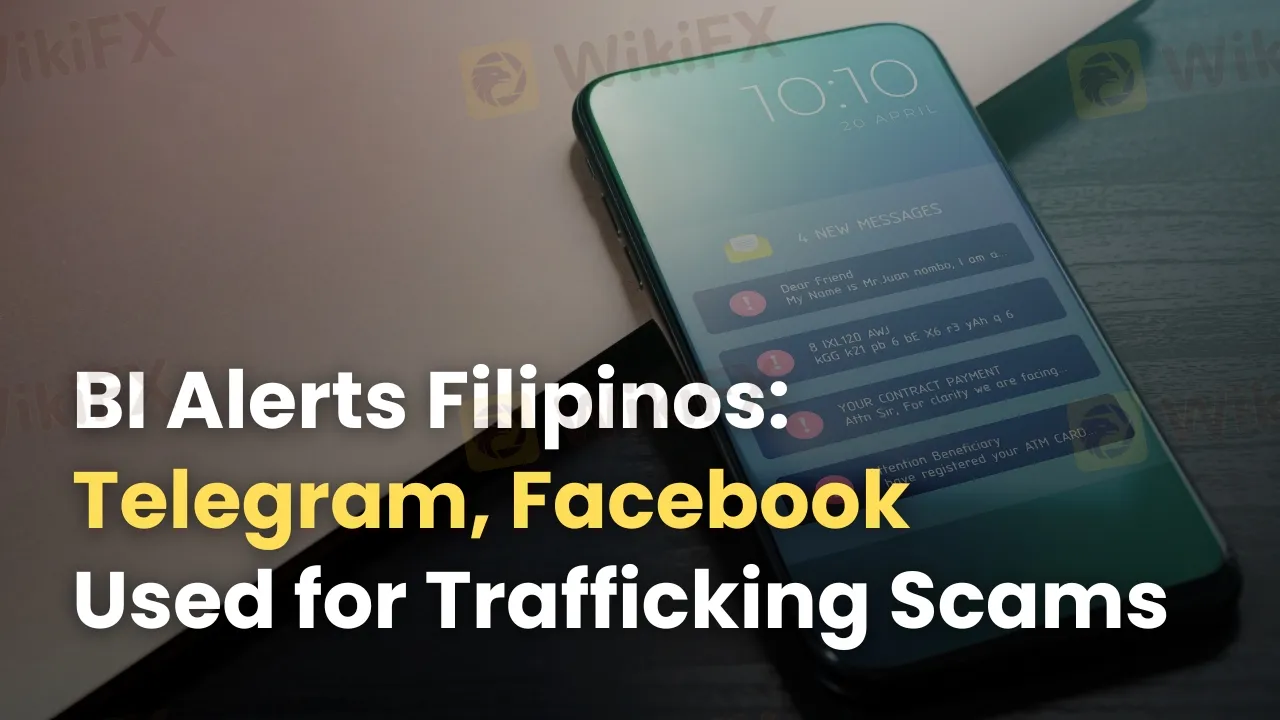简体中文
繁體中文
English
Pусский
日本語
ภาษาไทย
Tiếng Việt
Bahasa Indonesia
Español
हिन्दी
Filippiiniläinen
Français
Deutsch
Português
Türkçe
한국어
العربية
BI Alerts Filipinos: Telegram, Facebook Used for Trafficking Scams
Abstract:The Bureau of Immigration alerts Filipinos about Telegram and Facebook being used by traffickers to recruit victims for online scam hubs in Southeast Asia.

The Philippines‘ Bureau of Immigration (BI) is sounding the alarm over a chilling trend: human trafficking syndicates are using social media giants like Facebook and Telegram to prey on Filipinos, luring them into online scam operations across Southeast Asia. It’s a crisis thats snagging hopeful job seekers with the promise of big paychecks, only to trap them in a web of deceit.
BI Commissioner Joel Anthony M. Viado broke the news on Sunday, announcing that 125 trafficking victims were intercepted in 2024. He highlighted the surge in “catphishing”—phony job ads on social media that lead to exploitation. “For nine years, the Philippine government has stood firm against human trafficking,” Viado declared. “Our resolve to crush these syndicates is stronger than ever.”
This comes as the Philippines celebrates nine years as a Tier 1 country in the US State Department‘s 2024 Trafficking in Persons report, a nod to its robust anti-trafficking efforts. Yet, Tier 1 status doesn’t mean the problems solved—human trafficking remains a daily struggle.

Consider the close call on March 28: four Filipinos—three men and one woman—almost flew to Malaysia after falling for fake social media job offers. Once ensnared, they were coerced into running love scams with fabricated personas. Its a gut-wrenching example of how cunning these recruiters are.
In a larger rescue, 206 Filipinos were repatriated from Myawaddy, Myanmar, earlier this year, freed from forced labor in cyber-fraud schemes. Ranging from 20 to 44 years old, many were college-educated and from Metro Manila or nearby provinces, proving no ones immune.
Traffickers disguise these scams as legitimate gigs, often posing as local business process outsourcing (BPO) jobs, before shipping victims to hotspots like Malaysia, Cambodia, Laos, or Myanmar.
Social media is their weapon of choice. Platforms like Facebook and Telegram let syndicates cast wide nets, targeting the desperate and unwary. The BI is fighting back, partnering with the Department of Justices Inter-Agency Council Against Trafficking to monitor online traps and stop victims at borders.
Its a harsh reality check: those dream jobs posted online might hide a trafficking nightmare. The battle rages on, but staying informed could be the key to saving lives.

Disclaimer:
The views in this article only represent the author's personal views, and do not constitute investment advice on this platform. This platform does not guarantee the accuracy, completeness and timeliness of the information in the article, and will not be liable for any loss caused by the use of or reliance on the information in the article.
Read more

Interactive Brokers Enhance Account Security with FDIC Coverage
Interactive Brokers now offers up to $5M FDIC insurance for individual accounts, boosting protection on cash held in brokerage accounts starting May 2025.

Exnova Forex Broker Scam: Blocked Accounts, Lost Funds
Exnova forex broker slammed for scam tactics, blocking withdrawals, and dodging regulation. Victims warn of fraud risks—steer clear!

TriumphFX Rebrands to Continue Global Fraud: Over RM80 Million Lost
The notorious forex investment company TriumphFX, previously exposed for running a global scam operation for over a decade, is now being accused of rebranding itself to continue defrauding unsuspecting investors. Despite being unregulated and based offshore in Seychelles, TriumphFX has actively targeted Malaysian investors, luring them with false promises and eventually converting funds into cryptocurrency, making recovery nearly impossible.

Vantage Markets Review 2025: Trusted Forex and CFD Trading Since 2009
Explore our 2025 Vantage Markets review! A trusted Sydney-based broker since 2009, offering forex, CFDs, low spreads, global regulation, and 24/7 support. Trade from $50!
WikiFX Broker
Latest News
OctaFX Flagged by Malaysian Authorities
IronFX Broker Review 2025: A Comprehensive Analysis of Trustworthiness and Performance
Nonfarm Data Lifts Market Sentiment, U.S. Stocks Rebound Strongly
Interactive Brokers Enhances PortfolioAnalyst with New Features
Why Your Worst Enemy in Trading Might Be You
Errante Broker Review
Interactive Brokers Enhance Account Security with FDIC Coverage
SFC Issues Restriction Notice to GA (Int’l) Capital Management Limited Over Regulatory Concerns
WikiFX Forex Community Expert AMA
Exnova Forex Broker Scam: Blocked Accounts, Lost Funds
Currency Calculator


